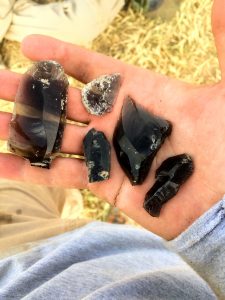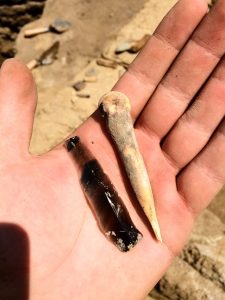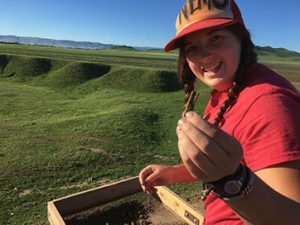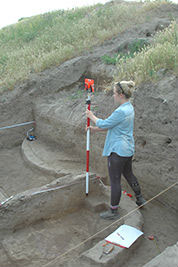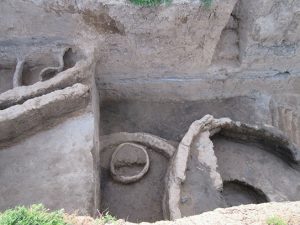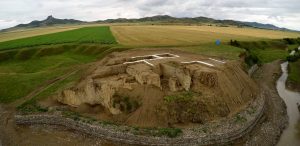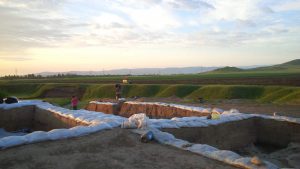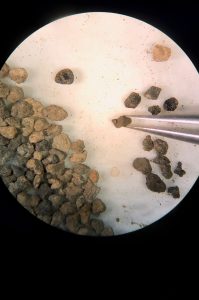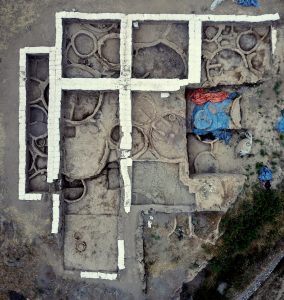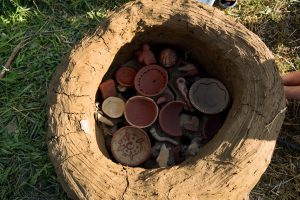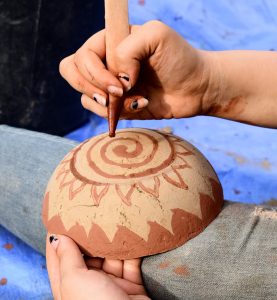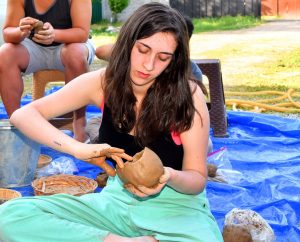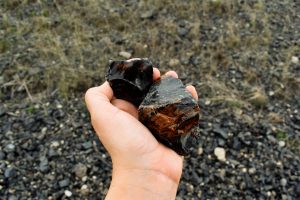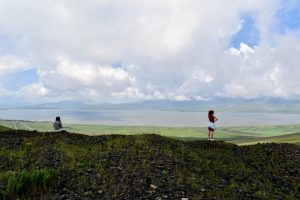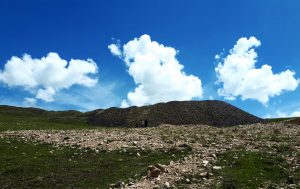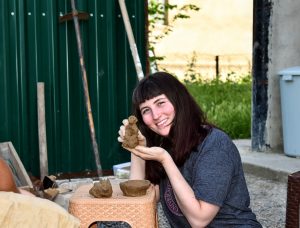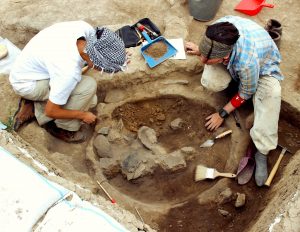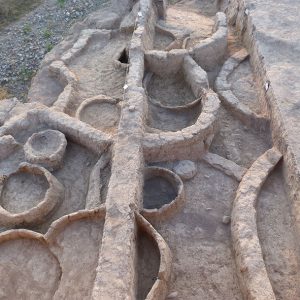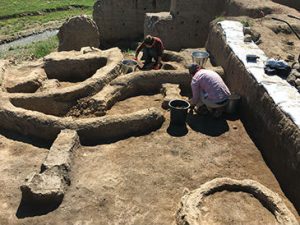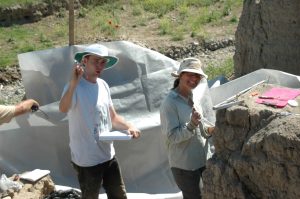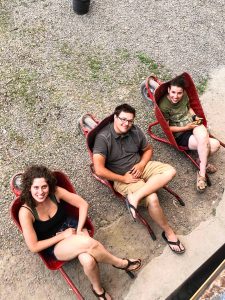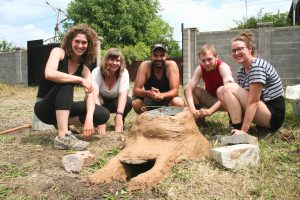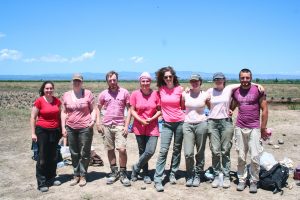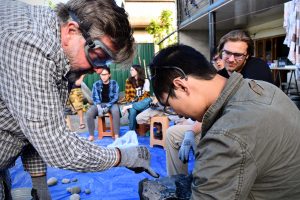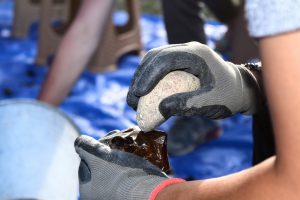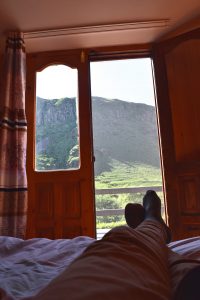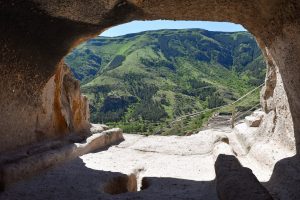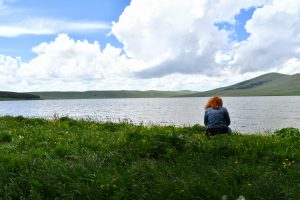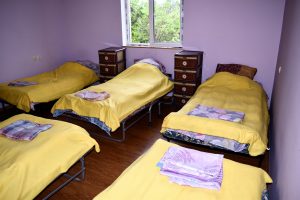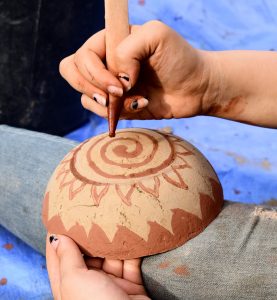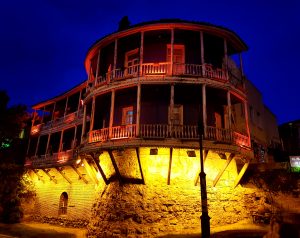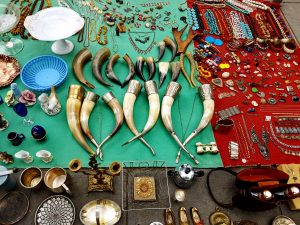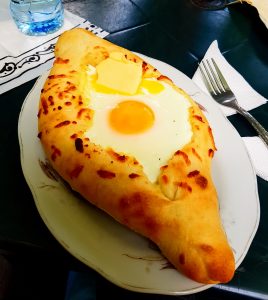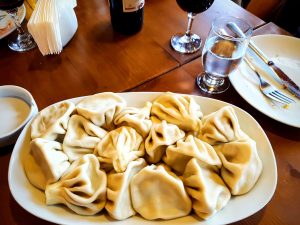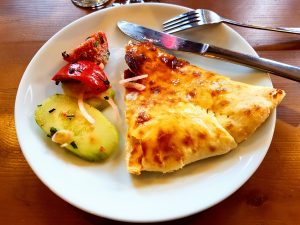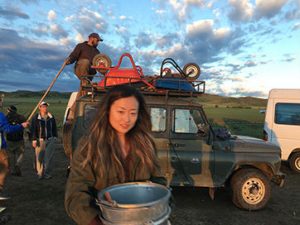Archaeology Training at GRAPE
This will be the sixth season of GRAPE’s field work in the Republic of Georgia. The Gadachrili Gora Regional Archaeological Program Expedition (GRAPE) is an international multidisciplinary research project investigating the emergence of farming economies in the South Caucasus and the development of local Neolithic, Chalcolithic & Early Bronze Age cultures. GRAPE investigates the Near Eastern influence on the development of local lifeways and, conversely, the influence of Caucasia on the Near East. The GRAPE project provides a unique opportunity to receive intensive training in archaeological field and survey methods at Neolithic through Early Bronze Age sites. Our fieldwork will include work at Gadachrili Gora, a Neolithic Shulaveris Shomutepe site, with evidence of the world’s earliest wine.
Spaces on the project are limited. All Experience and Skill Levels are Welcome.
Project participants, students and volunteers, are integrated into the GRAPE research team. Everyone is welcome to participate in project workshops, lectures, activities and trips. All participants must adhere to the GRAPE code of conduct while on the project. GRAPE is an inclusive research project. We, as a community, hold each other accountable to a high standard of scientific and professional conduct.
Weekdays: Participants work with archaeologists 5 days/week. Mornings are spent excavating and surveying in the field. Participants will gain experience with excavation techniques, sample collection, archaeological recording, mapping, and digital documentation. Over the season participants will gain proficiency in excavating and recording fragile contexts, and identifying archaeological remains. The evenings are spent processing recovered material at the dig-house. Students receive instruction on faunal processing, lithic analysis, ceramic processing, sediment processing and botanical recovery.
Experimental Sessions: Throughout the field season the team conducts hands-on experimental archaeology workshops. These include: obsidian stone tool making, bone awl fashioning, ceramic making, kiln building, and meal preparation.
Weekends: Most weekends, the project plans a one or two day trip to a culturally significant location in the Republic of Georgia. Destinations may include: Dimanisi, Mt. Chikiani, Vardzia, Mtskheta, and Tbilisi. Most Saturday evenings and Sundays will be free for participants to recuperate or explore Georgia.
Next Sessions
Session 1: May 24-June 19, 2026
Session 2: June 21 July 17, 2026
University of Toronto Credit: NMC290/291 H or Directed-Study Students
This option is for University and College students wishing to receive a credit for their participation in the archaeology training program. To receive credit students must participate in all field work, laboratory work, workshops, experimental sessions, lectures, and trips. Students must also submit all course assignments.
Non-Credit
This option is for those interested in the archaeology training program, that do not wish to receive a credit. Course participants will be included in the NMC290H and 291H activities: field work, laboratory work, workshops, experimental sessions, lectures, and trips. Course participants may submit assignments, if they chose.
Volunteer
This option is designed for those interested in participating in excavation and survey with some artifact processing or analysis. Volunteers will be included in field work, preliminary artifact intake, workshops and experimental sessions. Volunteers can join any lectures and trips. They must reserve their spot with the project and pay for their participation in the excursion or activity.
NMC290/ 291H: Field Archaeology in The Republic of Georgia (2026)
These courses are designed as a general practicum and training program in archaeological field methods. As a field course, emphasis will be placed on active participation in ongoing research by the Gadachrili Gora Regional Archaeological Project Expedition (GRAPE) in the Republic of Georgia. Students will receive extensive training in archaeological excavation and survey methods, survey procedures, the preliminary process of processing artifacts, and experimental archaeology – recreating ancient artifacts and lifeways. Weekly field trips explore the archaeology and culture of the region, which will supplement the primary focus on fieldwork experience.
GRAPE offers a university level credit, NMC290/1H: Field Archaeology in The Republic of Georgia, through the University of Toronto to students who complete the archaeology training program. To receive credit students must participate in all field work, laboratory work, workshops, experimental sessions, lectures, and trips. Students must also submit all course assignments. NMC290/1H fulfills the field requirement for the Archaeology Specialist Degree in the Department of Anthropology at the UofT. No prior field experience in necessary. Credits are transferable.
Students can enroll in a single course, or take the second half to receive extra training and credit.
A non-credit, volunteer version of the course is available in 2026. This option is for those interested in the archaeology training program, that do not wish to receive a credit. Course participants will be included in the NMC290/1 H activities: field work, laboratory work, workshops, experimental sessions, lectures, and trips. Course participants may submit assignments, if they chose.
Instructors
Dr. Stephen Batiuk is currently a Research Associate in the Department of Near & Middle Eastern Civilizations and the Archaeology Centre of the University of Toronto, and Direct of ArchaeoTek Canada. With more than 25 years of fieldwork experience he has participated in over 12 different archaeological projects from CRM (Cultural Resource Management) work in Canada to projects in Ethiopia, Turkey, Israel, Romania, France and Georgia. His more recent publications and research are focused on understanding the origins of wine production in Transcaucasia (specifically Georgia) but perhaps more importantly, the spread of this early Georgian wine culture across the entire Near East and eventually the rest of the world. Dr. Batiuk brings a well developed skills in landscape and materials analysis, particularly ancient ceramics.
Ira Schwartz is a PhD candidate in the Anthropology department at the University of Toronto. His dissertation research focuses on understanding how pottery making practices during the Chalcolithic period (ca 4700-3600BCE) in the Jordan Valley can inform us about the development communities of practice and changing social boundaries. He has over 10 years of experience excavating in Jordan, Georgia, Iraq, and Canada where he has co-directed several survey and excavation projects. He is currently the field director at Azizkendi Tepe, a Late Chalcolithic period site in Georgia.
Lodging:
Participants will be housed in double or triple-occupancy rooms, in a small hotel on the outskirts of the town of Marneuli, about 20km from the site. Each room is equipped with its own bathroom. Transportation to and from the hotel to the site/lab will be provided. Sleeping arrangements are divided by gender.
There may be several free days when participants may be able to travel to Tbilisi. Participants who choose to do so will be responsible for their own food and lodging while away.
For the duration of the excavation, breakfast and dinner are provided during the work week (Mon-Fri)at the hotel
You are responsible for your own lunches, and all meals during the weekend. Georgian cuisine is generally meat-oriented, but we can accommodate vegetarian diets. However, we are not able to offer a vegan or gluten-free option. There is a small store near the hotel where you can purchase fresh cheese, various meat products, garden vegetables, bread, drinks, etc. In Marneuli, a city about 5km away, you can find restaurants, Shuarma stands and supermarkets.
Dishes may include: cilantro, walnuts, fish, chicken, beef, pork.
Discuss any dietary restrictions prior to joining the team.
Amenities
– Internet (wifi)
– Laundry
– Showers
– Shared rooms
May and June are late spring months in the Republic of Georgia and weather patterns can be highly variable – from clear and hot to wet and cold in a short period of time. Nevertheless, the area we will be working in is generally comfortable and very similar to what we experience here in Toronto at the same time of year. The afternoons are characterized by highs of 23–25°C, while the evenings and mornings can be cool (lows of 12–17°C).
Participants are encouraged to pack for highly variable weather conditions. Here are the four situations you should pack for during your time in Georgia with GRAPE.
- The Field (6am-1pm Monday to Friday): Outside in the elements from sunrise to midday. Temperatures range from 15 to 30oC on site. There will be lots of sun exposure. We will likely get caught in the rain.
- The Lab (4pm-6pm): cleaning dirty artifacts, working with dirt, making pottery at the site or the dig-house. These clothes will get dusty/dirty.
- Lounging (Daily and weekends): hanging out around the house and in the village
- Touring and Special Occasions (Weekends!): Going out with the team and peers. Sometimes this will involve a lot of walking or a nice dinner out in the city. It may also involve an overnight stay in a different town or city.
NOTE: There is the potential for significant rain.
We also suggest you bring your own sleeping bag or sleeping bag liner. A more extensive list will be sent to all accepted participants.
Master Packing List of Overseas Archaeological Projects – Isaac Ullah
Project Accessibility
Participants of varying ability are welcome at GRAPE.
Mobility: To ensure safety, participants in our 2026 field season must be independently mobile on uneven terrain and in poor lighting conditions.
Language: GRAPE field work is conducted in English. To participate in the University Credited courses basic written and spoken English are necessary. To participate in the project basic English or Georgian (საქართველო ) is necessary. Members of the research and teaching team also speak: French, Arabic, Russian, and Ukrainian.
Physical Stressors at GRAPE 2026
These are listed to bring awareness to potentially strenuous situations. If you have previous injures or conditions that may be exacerbated by the described activities, please discuss the specifics with the project. This will not impact your acceptance onto the GRAPE 2026 season.
Walking: while surveying project participants will be walking throughout the day. The walking is discontinuous. The session may last for up to 5 hours.
Bending: While surveying and excavating participants will frequently need to bend over to pick up archaeological material.
Lifting: Lifting 9-15L of soil. Moving wheelbarrows filled with soil.
Carrying: moving soil, samples, and field equipment
Crouching and Squatting: while excavating you will often crouch or squat to be near the excavation surface.
Sleeping on a cot: Project cots are minimal, with a thin mattress and pillow provided. If you require a more supportive or forgiving surface we suggest bringing a pillow, sleeping bag, or sleeping pad.
Emotional and Psychological Wellbeing
Extended time living and working away from a familiar environment in close communal quarters is a strenuous element of field work.
Keeping in Contact with Home- a quiet room will be designated for private calls. Project WiFi is available, although unpredictable. Participants can also purchase a Georgia SIM card with data (this is inexpensive and reloadable).
If you require medicines not available in The Republic of Georgia, or are struggling with substance use consult a physician prior to applying to GRAPE. In Georgia wine is regularly served with meals. If you are under medical care of any kind, you are advised to consult with a physician before going to the Republic of Georgia. All health concerns should be discussed with the GRAPE Team during the application process.
If the above are obstacles to your participation in GRAPE’s 2026 field work, please reach out to us. We are prepared to discuss alternative participation in our research.
Volunteer
Includes: Field work, preliminary artifact intake, workshops and experimental sessions.
Volunteers can join any lectures and trips, but must cover their own expenses by paying the project for their spot ahead of time.
Dates – Gadachrili Excavations and Survey
· Session 1: May 24- June 19, 2026 (4 weeks mandatory)
· Session 2: June 21- July 17, 2026 (4 weeks mandatory)
Costs – Gadachrili Excavations and Survey: US$2645 per each 4-week session
The fee is for each individual session. It includes a $695 non refundable registration fees, room and board as described above, lectures, training, most gear, site access, museum clearance. If you register before March 1st, 2026, you are expected to pay at the time of registration $695 (the non-refundable registration portion of the fees), as well as any ancillary fees (such as weekend field trips and chartered bus tickets from the airport to our hotel, and back) within 21 days after being accepted to the program. The remainder of the fees are to be paid in full no later than April 15, 2025. No refund will be considered after March 14, 2026.
The program fees do not include the trip to and from Georgia. Participants must arrange their own travel to and from Georgia, and health/travel insurance. Participants who are not taking the chartered bus from the Tbilisi to our hotel (and back) are responsible to get to our base on their own (instructions will be provided with the travel kit in March 2025). Participants are responsible for their own meals during weekends, and lunches during the week, as described above
Team size -18-20 participants
At the present time, no entry visa is required for Georgia for up to 12 weeks for EU, US, Canadian, Australian and New Zealand citizens.
Covid-19 vaccination is required to be allowed to participate to the program. If at any time, you test positive for COVID-19 while in Georgia, it is strictly the responsibility of the participant to fulfill all the conditions required by law by the host country at their own expense.
OPTIONAL
NMC290/1H Student (University of Toronto Credit) (2026)
This option is designed for University and College students wishing to receive a credit for their participation in the course. Participation in all field work, laboratory work, workshops, experimental sessions, lectures and trips is required for participants to receive the credit. Students must also submit all course assignments.
Registration and Course Fee: $816.00 – $897.00 CAD for Canadian students $6,615.28 CAD for International Students
Includes Registration and Tuition fee for University of Toronto 0.5 credit course; Instructors, specialized lectures, one-on-one instruction with professional archaeologists and evaluations
The deadline for fees payable to the University of Toronto: TBA
The deadline for fees payable to the GRAPE: TBA
Field Trips
Because public transportation in Georgia is either lacking or is highly unreliable, and due to the COVID-19 situation, for the safety of our participants, our staff and our hosts, we want to ensure our participants get to explore the magic of Georgia, while being as safe as possible. As a such, we are organizing four weekend day trips, to some amazing sites and museums:
First Weekend:
Day Trip #1 (weekend 1): Bolnisi Archaeological Museum, Dmanisi Paleolithic Site, Dmanisi Late Bronze- Iron Age Site (easy hiking required: 15min each way)
Optional drop off in Tbilisi for the Night (overnight hotel at your own expense)
Day Trip #2 Trip to Tbilisi, Georgian National Museum
Cost: US$160 for both trips or US$125 for the Bolnisi Trip and US$50 for the Tbilisi trip (the fees include transportation to the site/museum and entrance ticket – photo rights not included)
Second Weekend:
Weekend Trip
Day 1: Chikiani (Obsidian stone source, intensive hiking required, 30min each way) & Lake Parvani; – Akhalkalaki Castle (moderate hiking required, 15min each way), Khertversi fortress (moderate hiking required, 15min each way). Optional hike to Kurgans (intensive hiking required, 60min each way)
Day 2: Vadzia Cave Monastery site. Moderately intensive hiking, several hours
Cost: US$250 for full weekend (the fees include transportation to the site/museum and entrance ticket – hotel, dinner and breakfast, you provide your own lunches)
Third Weekend:
Weekend Trip – Winery & Monastery Tour:
Day 1: Signaghi, Signaghi Museum, St. Nino’s Convent, Shumi Winery, Telavi (Hotel, Dinner on your own)
Day 2: Alaverdi Monastary, Gremis’s Archaangel Complex, Nekresi Monastary, Khareba Winery
Cost: US$250 for full weekend (the fees include transportation to the sites/museum/ wineries and entrance ticket – hotel breakfast, you provide your own lunches and dinner)
Other Expenses
Airfare
Medical Travel Insurance
Travel Expenses (PCR Tests)
Georgian SIM Card
Independent Meals
Snacks and Ingredients
Miscellaneous Expenses
Personal Field Gear (Boots, trowel, sun protection)
Financial Assistance
Republic of Georgia Entry Requirements
Currently (January 2026), Americans and Canadians do not require a tourist visa to enter Georgia. Citizens of other countries may have additional requirements.
In light of recent global events, questions of safety are on everyone’s mind. Georgia is as a whole is very safe. In terms of the pandemic, the situation is under control overall, and our prophylactic measures ensure that our projects are safe for both participants and hosts. Full Covid-19 vaccination is required for all participants and staff.
The Ukraine-Russia war has no impact on Georgia in terms of safety or security.
In terms of physical safety, most crimes in Georgia take the form of petty theft or corruption. Very few violent crimes have occurred in the country.
There is no terrorist threat whatsoever in regards to Georgia . Georgia is a country with the lowest terrorism risk in the world – for references, check: https://www.visionofhumanity.org/maps/global-terrorism-index/#/ . Also, have a look at the Department of State specific Georgia page for more information: https://travel.state.gov/content/travel/en/international-travel/International-Travel-Country-Information-Pages/Georgia.html. Statistically speaking, as far as crime (and terrorist threats) are concerned, you will be safer in Georgia than in any major city in the US (for reference on comparative crime rates, see https://www.numbeo.com/crime/rankings_by_country.jsp). Although there are a large number of protest in Georgia right now because of disagreement of some of the actions of the government, all have been peaceful. Exercising regular precautions (i.e.. Not taking part in any demonstrations) is all that is required.
Getting to the Project
Participants must make their own travel arrangements to Tbilisi in the Republic of Georgia.
Flights to Tbilisi usually connect through: France, Germany, Istanbul, Kiev, and Warsaw.
Travel to Georgia can be a little complex. Most flights (with the exception of AirFrance) arrive at 4am.The simplest way to get to our base is to fly into Tbilisi airport on Sunday (May 24 or June 21, 2026), and spend the night in Tbilisi. Flights Usually land at 3am in Tbilisi, so book your accommodations for the night of the 23rd. There are numerous affordable AirBNB’s, hostels or small hotels in town (a list of suggestions will be provided) will be provided. Take a Ride Share (use the Bolt App) or Taxi (arrange from small desk beside the exit, DO NOT ANSWER TO RANDOM PEOPLE ASKING YOU IF YOU WANT A TAXI, THEY WILL CHARGE 4X THE REGULAR PRICE). We will pick up those who wish later that day at 12APM at the Georgian National Museum of Rustaveli Street and will drive you to our base. The bus ride is, under normal circumstances, 1h long. The cost for a one way ticket on our chartered bus is US$30. The Bolt Rideshare App can also bring you to the hotel for a cost of between US$40-60.
COVID-19 Requirements to be posted in February 2025.
All participants will require a minimum of two (2) COVID-19 vaccinations.
Participants must bring face masks and hand sanitizer for personal use on the project
Health Insurance
All project participants must be covered by viable travel health insurance. The project will cannot insure participants. Students enrolled in the University of Toronto may use their UofT health insurance.
Sightseeing
Marneuli is located in the center of Kvemo Kartli, a region of great historical significance in the Republic of Georgia. The locality of Marneuli itself is not surrounded by an extensive number of important cultural sites, but is a mere 45min to 1hr from Tbilis, the Capital. From there students can travel around much of the country.
While small, because the transportation system is not efficient, it can take a long time to get to certain sites/ regions.
Students are encouraged to explore the city of Tbilisi, with its Sulfur Baths, Castle and bustling markets and nightlife. From there day trips can be taken to sites like Mtskheta and Jvari, or Gori and Uplistkhe, Akhaltsikhe and Borjomi.
Longer trips can include hiking in the Caucasus Mountains at Kazbegi, Kutaisi and the Prometheus Caves, or even going to the Black Sea coast and visiting Batumi.
Georgia has many amazing sites to explore, beyond what the project immediately offers and we strongly recommend taking a few extra days/ weeks to explore the country after the excavations.6
